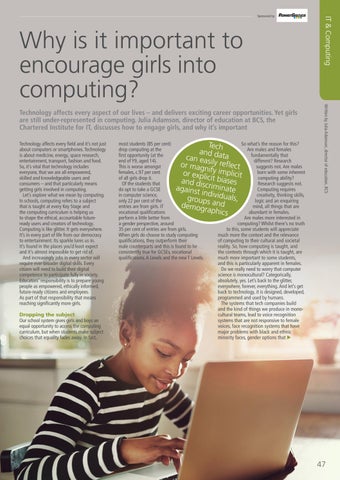Why is it important to encourage girls into computing? Technology affects every field and it’s not just about computers or smartphones. Technology is about medicine, energy, space research, entertainment, transport, fashion and food. So, it’s vital that technology includes everyone, that we are all empowered, skilled and knowledgeable users and consumers – and that particularly means getting girls involved in computing. Let’s explore what we mean by computing. In schools, computing refers to a subject that is taught at every Key Stage and the computing curriculum is helping us to shape the ethical, accountable futureready users and creators of technology. Computing is like glitter. It gets everywhere. It’s in every part of life from our democracy to entertainment. Its sparkle lures us in. It’s found in the places you’d least expect and it’s almost impossible to get rid of. And increasingly jobs in every sector will require ever-broader digital skills. Every citizen will need to build their digital competence to participate fully in society. Educators’ responsibility is to prepare young people as empowered, ethically informed, future-ready citizens and employees. As part of that responsibility that means reaching significantly more girls. Dropping the subject Our school system gives girls and boys an equal opportunity to access the computing curriculum, but when students make subject choices that equality fades away. In fact,
So what’s the reason for this? most students (85 per cent) Tech Are males and females drop computing at the and da fundamentally that first opportunity (at the t a can eas different? Research end of Y9, aged 14). i or mag ly reflect suggests not. Are males This is worse amongst n born with some inherent females, c.97 per cent or expli ify implicit c computing ability? of all girls drop it. i t b i ases and dis Research suggests not. Of the students that against criminate Computing requires do opt to take a GCSE ind creativity, thinking skills, in computer science, groups ividuals, logic and an enquiring only 22 per cent of the a demog nd mind, all things that are entries are from girls. IT raphics abundant in females. vocational qualifications Are males more interested in perform a little better from computing? Whilst there’s no truth a gender perspective, around to this, some students will appreciate 35 per cent of entries are from girls. much more the context and the relevance When girls do choose to study computing of computing to their cultural and societal qualifications, they outperform their reality. So, how computing is taught, and male counterparts and this is found to be the contexts through which it is taught, are consistently true for GCSEs, vocational much more important to some students, qualifications, A Levels and the new T Levels. and this is particularly apparent in females. Do we really need to worry that computer science is monocultural? Categorically, absolutely, yes. Let’s back to the glitter, everywhere, forever, everything. And let’s get back to technology, it is designed, developed, programmed and used by humans. The systems that tech companies build and the kind of things we produce in monocultural teams, lead to voice recognition systems that are not responsive to female voices, face recognition systems that have major problems with black and ethnic minority faces, gender options that E
Written by Julia Adamson, director of education, BCS
Technology affects every aspect of our lives – and delivers exciting career opportunities. Yet girls are still under-represented in computing. Julia Adamson, director of education at BCS, the Chartered Institute for IT, discusses how to engage girls, and why it’s important
IT & Computing
Sponsored by
47














